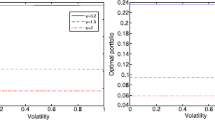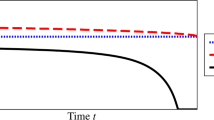Abstract
This paper studies the following cooperative investment game with two agents. At the start of the game, both the agents’ capital are collected. The total capital are then invested according to a certain trading strategy. At a certain time T 0 one agent quits the cooperation and they divide the wealth among themselves. During the remaining period [T 0, T], the other agent invests his/her capital following a possibly different trading strategy. By stochastic optimization method combined with the theory of Backward Stochastic Differential Equations (BSDEs, for short), we give an equivalent characterization of the Pareto optimal cooperative strategies.
Similar content being viewed by others
References
J. C. Cox and C. F. Huang, Optimal consumption and portfolio policies when asset prices follow a diffusion process, J. Econ. Theory, 1989, 49: 33–83.
J. C. Cox and C. F. Huang, A variational problem arising in financial economics, J. Math. Econ., 1991, 20: 465–487.
I. Karatzas, J. P. Lehoczky, and S. E. Shreve, Optimal portfolio and consumption decision for a small investor on a finite horizon, SIAM J. Contr. Optim., 1987, 25: 1557–1586.
S. R. Pliska, A stochastic calculus model of continuous trading: Optimal portfolio, Math. Oper. Res., 1986, 11: 371–382.
H. He and N. D. Pearson, Consumption and portfolio policies with incomplete markets and shortsale constraints: The finite-dimensional case, Math. Finance, 1991, 1: 1–10.
H. He and N. D. Pearson, Consumption and portfolio policies with incomplete markets and shortsale constraints: The infinite-dimensional case, J. Econ. Theory, 1991, 54: 259–304.
I. Karatzas, J. P. Lehoczky, S. E. Shreve, and G. L. Xu, Martingale and duality methods for utility maximization in incomplete markets, SIAM J. Contr. Optim., 1991, 29: 702–730.
D. Kramkov and W. Schachermayer, The asymptotic elasticity of utility functions and optimal investment in incomplete markets, Ann. Appl. Probab., 1999, 9: 904–950.
D. Kramkov and W. Schachermayer, Necessary and sufficient conditions in the problem of optimal investment in incomplete markets, Ann. Appl. Probab., 2003, 13(4): 1504–1516.
J. M. Xia, Multi-agent investment in incomplete markets, Finance and Stochastics, 2004, 8: 241–259.
S. Peng, A generalized dynamic programming principle and Hamilton-Jacobi-Bellmen equation, Stochastics and Stoch. Reports, 1992, 38: 119–134.
L. J. Billera, On games without side payments arising from a general class of markets, J. Math. Econ., 1971, 1(2): 129-139.
L. J. Billera and R. E. Bixby, A characterization of polyhedral market games, Internat. J. Game Theory, 1973, 2: 253–261.
G. Debreu and H. Scarf, A limit theorem on the core of an economy, Int. Econ. Rev., 1963, 4(3): 235-246.
G. Owen, Game Theory, 3rd ed, Academic Press, San Diego, 1995.
J. Rosenmüller, The Theory of Games and Markets, North-Holland, Amsterdam New York Oxford, 1981.
L. S. Shapley and M. Shubik, On market games, J. Econ. Theory, 1969, 1: 19–25.
L. S. Shapley and M. Shubik, Competitive outcomes in the cores of market games, Internat. J. Game Theory, 1975, 4(4): 229-237.
K. K. Aase, Perspectives of risk sharing, Scand. Actuarial J., 2002, 2: 73–128.
B. Baton and J. Lemaire, The core of a reinsurance market, Astin Bull., 1981, 12: 57–71.
K. Borch, Equilibrium in a reinsurance market, Econometrica, 1962, 30(3): 424–444.
H. Bühlmann and W. S. Jewell, Optimal risk exchanges, Astin Bull, 1979, 10: 243–262.
H. U. Gerber, Pareto-optimal risk exchanges and related decision problems, Astin Bull, 1978, 10: 25–33.
J. Suijs, A. D. Waegenaere, and P. Borm, Stochastic cooperative games in insurance, Insurance: Mathematics and Economics, 1998, 22: 209–228.
F. Delbaen and W. Schachermayer, A general version of the fundamental theorem of asset pricing, Math. Ann., 1994, 300: 463–520.
F. Delbaen and W. Schachermayer, The fundamental theorem of asset pricing for unbounded stochastic processes, Math. Ann., 1998, 312: 215–250.
J. A. Yan, A new look at the fundamental theorem of asset pricing, J. Korean Math. Soc., 1998, 35(3): 659–673.
R. T. Rockafellar, Convex Analysis, Princeton University Process, Princeton, 1970.
I. Karatzas and S. E. Shreve, Methods of Mathematical Finance, Springer, Berlin, 2004.
J. Yong and X. Zhou, Stochastic Controls: Hamilton Systems and HJB Equations, Springer, New York, 1999.
M. Mania and R. Tevzadze, Backward Stochastic PDEs Related to the Utility Maximization Problem, http://arxiv.org/pdf/0806.0240, 2008.
Author information
Authors and Affiliations
Corresponding author
Additional information
This research is partially supported by the Natural Science Foundation of China under Grant Nos. 11001029 and 10971220, and the Fundamental Research Funds for the Central Universities (BUPT2009RC0705).
This paper was recommended for publication by Editor Shouyang WANG.
Rights and permissions
About this article
Cite this article
Zhou, Q. Two-agent Pareto optimal cooperative investment in incomplete market: An equivalent characterization. J Syst Sci Complex 24, 701–710 (2011). https://doi.org/10.1007/s11424-010-9002-z
Received:
Revised:
Published:
Issue Date:
DOI: https://doi.org/10.1007/s11424-010-9002-z




